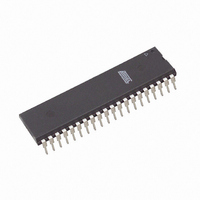ATMEGA16-16PU Atmel, ATMEGA16-16PU Datasheet - Page 230

ATMEGA16-16PU
Manufacturer Part Number
ATMEGA16-16PU
Description
IC AVR MCU 16K 16MHZ 5V 40DIP
Manufacturer
Atmel
Series
AVR® ATmegar
Datasheets
1.ATMEGA16L-8MI.pdf
(26 pages)
2.ATMEGA16L-8MI.pdf
(357 pages)
3.ATMEGA16-16PU.pdf
(358 pages)
4.ATMEGA16-16PU.pdf
(351 pages)
Specifications of ATMEGA16-16PU
Core Processor
AVR
Core Size
8-Bit
Speed
16MHz
Connectivity
I²C, SPI, UART/USART
Peripherals
Brown-out Detect/Reset, POR, PWM, WDT
Number Of I /o
32
Program Memory Size
16KB (8K x 16)
Program Memory Type
FLASH
Eeprom Size
512 x 8
Ram Size
1K x 8
Voltage - Supply (vcc/vdd)
4.5 V ~ 5.5 V
Data Converters
A/D 8x10b
Oscillator Type
Internal
Operating Temperature
-40°C ~ 85°C
Package / Case
40-DIP (0.600", 15.24mm)
Package
40PDIP
Device Core
AVR
Family Name
ATmega
Maximum Speed
16 MHz
Operating Supply Voltage
5 V
Data Bus Width
8 Bit
Number Of Programmable I/os
32
Interface Type
TWI/SPI/USART
On-chip Adc
8-chx10-bit
Number Of Timers
3
Processor Series
ATMEGA16x
Core
AVR8
Data Ram Size
1 KB
Maximum Clock Frequency
16 MHz
Maximum Operating Temperature
+ 85 C
Mounting Style
Through Hole
3rd Party Development Tools
EWAVR, EWAVR-BL
Development Tools By Supplier
ATAVRDRAGON, ATSTK500, ATSTK600, ATAVRISP2, ATAVRONEKIT
Minimum Operating Temperature
- 40 C
A/d Inputs
8-Channel, 10-Bit
Cpu Speed
16 MIPS
Eeprom Memory
512 Bytes
Input Output
32
Interface
JTAG/SPI/UART
Memory Type
Flash
Number Of Bits
8
Package Type
44-pin PDIP
Programmable Memory
16K Bytes
Timers
2-8-bit, 1-16-bit
Voltage, Range
4.5-5.5 V
Controller Family/series
AVR MEGA
No. Of I/o's
32
Eeprom Memory Size
512Byte
Ram Memory Size
1KB
Rohs Compliant
Yes
For Use With
ATSTK600-TQFP44 - STK600 SOCKET/ADAPTER 44-TQFPATSTK600-DIP40 - STK600 SOCKET/ADAPTER 40-PDIP770-1007 - ISP 4PORT ATMEL AVR MCU SPI/JTAGATAVRISP2 - PROGRAMMER AVR IN SYSTEMATJTAGICE2 - AVR ON-CHIP D-BUG SYSTEMATSTK500 - PROGRAMMER AVR STARTER KIT
Lead Free Status / RoHS Status
Lead free / RoHS Compliant
Available stocks
Company
Part Number
Manufacturer
Quantity
Price
Company:
Part Number:
ATMEGA16-16PU
Manufacturer:
Atmel
Quantity:
140
- ATMEGA16L-8MI PDF datasheet
- ATMEGA16L-8MI PDF datasheet #2
- ATMEGA16-16PU PDF datasheet #3
- ATMEGA16-16PU PDF datasheet #4
- Current page: 230 of 357
- Download datasheet (8Mb)
Boundary-scan Chain
Boundary-scan
Specific JTAG
Instructions
EXTEST; $0
IDCODE; $1
SAMPLE_PRELOAD;
$2
2466T–AVR–07/10
Figure 115. Reset Register
The Boundary-scan Chain has the capability of driving and observing the logic levels on the dig-
ital I/O pins, as well as the boundary between digital and analog logic for analog circuitry having
Off-chip connections.
See
The instruction register is 4-bit wide, supporting up to 16 instructions. Listed below are the JTAG
instructions useful for Boundary-scan operation. Note that the optional HIGHZ instruction is not
implemented, but all outputs with tri-state capability can be set in high-impedant state by using
the AVR_RESET instruction, since the initial state for all port pins is tri-state.
As a definition in this datasheet, the LSB is shifted in and out first for all Shift Registers.
The OPCODE for each instruction is shown behind the instruction name in hex format. The text
describes which Data Register is selected as path between TDI and TDO for each instruction.
Mandatory JTAG instruction for selecting the Boundary-scan Chain as Data Register for testing
circuitry external to the AVR package. For port-pins, Pull-up Disable, Output Control, Output
Data, and Input Data are all accessible in the scan chain. For Analog circuits having Off-chip
connections, the interface between the analog and the digital logic is in the scan chain. The con-
tents of the latched outputs of the Boundary-scan chain is driven out as soon as the JTAG IR-
register is loaded with the EXTEST instruction.
The active states are:
•
•
•
Optional JTAG instruction selecting the 32-bit ID-register as Data Register. The ID-register con-
sists of a version number, a device number and the manufacturer code chosen by JEDEC. This
is the default instruction after power-up.
The active states are:
•
•
Mandatory JTAG instruction for pre-loading the output latches and talking a snap-shot of the
input/output pins without affecting the system operation. However, the output latches are not
connected to the pins. The Boundary-scan Chain is selected as Data Register.
Capture-DR: Data on the external pins are sampled into the Boundary-scan Chain.
Shift-DR: The Internal Scan Chain is shifted by the TCK input.
Update-DR: Data from the scan chain is applied to output pins.
Capture-DR: Data in the IDCODE-register is sampled into the Boundary-scan Chain.
Shift-DR: The IDCODE scan chain is shifted by the TCK input.
“Boundary-scan Chain” on page 232
External Reset Sources
From other Internal and
From
ClockDR · AVR_RESET
TDI
D
for a complete description.
Q
TDO
To
ATmega16(L)
Internal Reset
230
Related parts for ATMEGA16-16PU
Image
Part Number
Description
Manufacturer
Datasheet
Request
R

Part Number:
Description:
Manufacturer:
Atmel Corporation
Datasheet:

Part Number:
Description:
IC AVR MCU 16K 16MHZ 5V 44TQFP
Manufacturer:
Atmel
Datasheet:

Part Number:
Description:
IC AVR MCU 16K 16MHZ 5V 44-QFN
Manufacturer:
Atmel
Datasheet:

Part Number:
Description:
MCU AVR 16K FLASH 16MHZ 44-QFN
Manufacturer:
Atmel
Datasheet:

Part Number:
Description:
IC AVR MCU 16K 16MHZ COM 40-DIP
Manufacturer:
Atmel
Datasheet:

Part Number:
Description:
IC AVR MCU 16K 16MHZ COM 44-QFN
Manufacturer:
Atmel
Datasheet:

Part Number:
Description:
IC AVR MCU 16K 16MHZ IND 40-DIP
Manufacturer:
Atmel
Datasheet:

Part Number:
Description:
IC AVR MCU 16K 16MHZ IND 44-QFN
Manufacturer:
Atmel
Datasheet:

Part Number:
Description:
IC AVR MCU 16K 16MHZ IND 44-TQFP
Manufacturer:
Atmel
Datasheet:

Part Number:
Description:
IC MCU 8BIT 16KB FLASH 44TQFP
Manufacturer:
Atmel
Datasheet:

Part Number:
Description:
MCU AVR 16K FLASH 16MHZ 44-TQFP
Manufacturer:
Atmel
Datasheet:

Part Number:
Description:
IC AVR MCU 16K 16MHZ COM 44-TQFP
Manufacturer:
Atmel
Datasheet:

Part Number:
Description:
IC MCU AVR 16K 5V 16MHZ 44-TQFP
Manufacturer:
Atmel
Datasheet:











